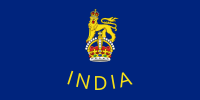But the Monarch hasn't / doesn't have any real power since the Magna Carta.
This isn't true. A lot of early English political disputes were between the upper class were over taxes and their rights none of which made the monarch a powerless figurehead. Post-MC saw some of the strongest monarchs in English history ranging from tyrants to politically savvy. Take Henry the 8th for example. He was a tyrant that did what he wanted whenever he pleased. He controlled Parliament via bribery, threats, sycophants and torture. The MC did nothing to curb his power. Parliament didn't start to exercise real power over the King until the English Civil War, post-Civil War, and the Windsor dynasty. The monarchy still has power today but the dynasty practices soft-power and as representatives of the people via E2. Her ancestors often let their own hardliner view creep into their public persona.
When the UK controlled India it was not as part of English Crown thus not subject to English law. The monarch of India was the Emperor/Empress of India. The Head of State of the British Empire held multiple titles simultaneously. England, Scotland, Ireland, Wales, Canada, India, Hanover, and so on. England was not the executive nor legislative branch of the British Empire. The Monarch of the Empire and the individual governments in those regions were. Each holding had it's own laws passed by whatever system the British Monarch or their representatives agreed to.
Canada and the USA were colonies of Europeans especially the British Isles demographics. So there is a population with specific legal and cultural set of expectations. Leadership aligned with those expectations in governing more often than those colonies and holding with no such cultural history. Hence the control and laws in different holdings varies based on culture and history of the populations present and what representatives could get away with.
Keep in mind delegation and vassals government was required in an era in which basic trans-Atlantic communication took 2-3 month one way voyages during the best seasonal winds. Keeping in mind what seasonal winds are in the Atlantic (Google it). One could issue an order in London to an oversea holding but wait a year for a reply.
I also heard Jinnah said he wanted to return to India and regretted the creation of Pakistan?
It is reported hearsay. Nothing official.

